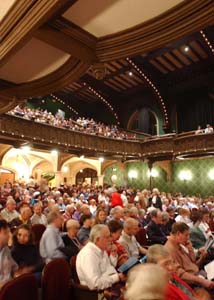 |
|
|||||||||
|
One hundred years of Mandel music The cheerleaders greeted new arrivals with admirable good humor, given that they were stationed, in perky maroon skirts and tanks, just inside the open Reynolds Club entrance on a crisp October night. The coeds held the door not only for their patrons, former Maroons headed to a homecoming dinner celebrating the University’s new Athletics Hall of Fame, but also for those who maneuvered past a second formation of cheerleaders and a clutch of jolly guests, seeking Reynolds’s more sedate recesses—the season’s opening-night concert at Mandel Hall.
Not to be outdone by the hall-of-famers, Mandel’s foyer also featured student greeters (in black slacks and white shirts) waiting for the crowds. The greeters, explained fourth-year house manager Andrew Elliott-Chandler, “really just smile at people, help them to their seats. A lot of our subscribers have been coming here for 20 or 30 years—and they like to make small talk and tell the usher that they’ve been coming here for 20 or 30 years.” As scattered, discreet decorations proclaimed, Mandel Hall has hosted music lovers for 100 years as of this fall. A gift from department-store tycoon Leon Mandel, the auditorium is modeled after the great hall of Crosby House, built in 1472 by the sheriff of London and rented to Richard III after his nephews were imprisoned in the Tower. At the 1903 opening ceremony, Harry Pratt Judson, then dean of the faculties of arts, literature, and science, said, “The dream of the builder is frozen into marble, is petrified for the ages in gray stone and oaken carvings; his floating fantastic visions are caught and embalmed in gargoyle and in chiseled dragon.” But where Judson saw a “poem in stone and oak,” a more recent observer was assaulted by a “Gothic monstrosity,” as longtime ticket-holder Ann Marks called the hall before the evening’s performance. Even the “ornate balcony, detailed oak woodwork, ornamental painting, and majestic windows” boasted of in the concert notes were yet more blemishes on “one of the ugliest buildings” she’d ever seen. But once the lights went down, all was forgiven. Marks comes to “as many [concerts] as they give,” she said, because “the music is great and gets better every year.” Indeed, Mandel has featured the Chicago debuts of violinist Isaac Stern and guitarist Andrea Sergovia, and, more recently, violinist Hilary Hahn and soprano Cecilia Bartoli. Tonight’s performance, produced by the University of Chicago Presents, featured the widely praised Emerson Quartet playing Beethoven’s Quartet No. 15 in A Minor, with special guests and University artists-in-residence Pacifica Quartet joining them for Mendelssohn’s Octet in E-flat Major. While the musicians were still hidden inside the empty hall, finishing rehearsals, the foyer was occupied by the dozen or so fans who arrived an hour early, hoping to secure last-minute seats for the nearly sold-out show. Jonathan, a young North Sider, heard that the Emerson Quartet was coming to town and found Mandel through Google. College student Lena came thinking student tickets were free. (Her date, fellow College student Gabriel, had earlier purchased tickets from the box office—$15 with valid student ID, $35 otherwise.) As the crowd swelled and the hum of conversation (“I just can’t keep my ears off of that Mendelssohn”) competed with the laughter of former athletes enjoying predinner cocktails, the musicians relinquished the stage while the 12 greeters-cum-ushers adjourned to their preshow pep talk in the hall’s hot and cramped anteroom. When the doors finally opened 20 minutes late, it became clear that not only the antechamber was unusually warm. Concertgoers, finding their seats, fanned themselves vigorously with their 100th-anniversary program notes, and in her introductory remarks Marna Seltzer, director of University of Chicago Presents, riffed about Mandel’s famously “warm” acoustic tones. But once the crowd settled, the temperature cooled enough to allow the Emerson Quartet the audience’s undivided attention. Of the evening’s first half, Chicago Tribune music critic John von Rhein gushed in his Sunday column, “With a breadth of vision equal to that of the music itself, the [Emerson Quartet] balanced inwardness with extroversion, poetry with passion. … The result was Beethoven playing of the very highest order.” After extended curtain calls the temperature rose again as the crowd meandered toward the exits for fresh air or cigarettes. Some patrons praised the performance (“You can never lose with Beethoven”), but the loudest voices wondered about the night’s Cubs-Marlins playoff game. Conflicting reports circulated: it was the bottom of the eighth; the top of the fifth; Cubs up 4–2; Cubs down by 1. The hall-of-famers, who might have commiserated with the sports-deprived ticketholders, were busy with a dinner presentation. When the lights flickered, the concertgoers filed back to their seats and found the Pacifica Quartet poised opposite the Emerson Quartet, ready to perform the second piece. A shorter work, the Mendelssohn was played with “sheer energy and freshness,” von Rhein wrote, as “the eight musicians meshed with a precision and finesse.” After another exhaustive round of bravos and curtain calls, many patrons retreated to the C-shop for complimentary dessert and a chance to chat with the musicians, who threaded their way through the crowd carrying their instruments on their backs like traveling minstrels. While the concertgoers munched on brownies and hummed snippets of Beethoven, the Cubs all but forgotten, a contingent of hall-of-famers, their evening ceremony over, beelined to Jimmy’s to catch the final innings.—A.L.M.
|
|
Contact
|


